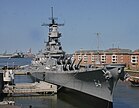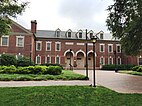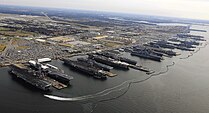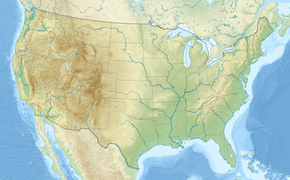
Back Norþfolc (Firginiæ) ANG نورفولك (فرجينيا) Arabic نورفولك (ڤيرچينيا) ARZ Norfolk (Virxinia) AST Norfolk (Virciniya) Azerbaijani نورفولک، ویرجینیا AZB Норфолк (Виргиния) Bashkir Norfolk, Virginia BAR Норфалк (Вірджынія) Byelorussian Норфалк (Вірджынія) BE-X-OLD
Norfolk | |
|---|---|
| Motto(s): Crescas (Latin for, "Thou shalt grow.") | |
 Interactive map of Norfolk | |
| Coordinates: 36°50′49″N 76°17′07″W / 36.84694°N 76.28528°W | |
| Country | United States |
| State | Virginia |
| County | None (independent city) |
| Founded | 1680 (as town) |
| Incorporated | 1736 (as borough) |
| Incorporated | 1845 (as city) |
| Government | |
| • Mayor | Kenny Alexander (D) |
| Area | |
| 96.40 sq mi (249.68 km2) | |
| • Land | 53.27 sq mi (137.98 km2) |
| • Water | 43.13 sq mi (111.70 km2) |
| Elevation | 7 ft (2.1 m) |
| Population (2020) | |
| 238,005 | |
| • Rank | 96th in the United States 3rd in Virginia |
| • Density | 4,468/sq mi (1,725/km2) |
| • Urban | 1,047,869 |
| • Metro | 1,725,246 (37th) |
| Time zone | UTC−5 (EST) |
| • Summer (DST) | UTC−4 (EDT) |
| ZIP Codes | 23501–23515, 23517–23521, 23523, 23529, 23541, 23551 |
| Area code(s) | 757, 948 |
| FIPS code | 51-57000[2] |
| GNIS feature ID | 1497051[3] |
| Primary Airport | Norfolk International Airport |
| Light Rail | The Tide |
| Public transportation | Hampton Roads Transit |
| Website | www |
Norfolk (locally /ˈnɔːrfʊk/ ⓘ NOR-fuuk) is an independent city in Virginia, United States. As of the 2020 census, Norfolk had a population of 238,005, making it the third-most populous city in Virginia after neighboring Virginia Beach and Chesapeake, and the 96th-most populous city in the nation.[4] Norfolk holds a strategic position as the historical, urban, financial, and cultural center of the Hampton Roads region (sometimes called "Tidewater"), which has more than 1.8 million inhabitants and is the 37th-largest metropolitan area in the U.S., with ten cities.[5]
Norfolk was incorporated as a town in 1682, borough in 1736 and city in 1845.[6] Bordered to the west by the Elizabeth River and to the north by the Chesapeake Bay, the city shares land borders with the independent cities of Chesapeake to its south and Virginia Beach to its east. With coastline along multiple bodies of water, Norfolk has many miles of riverfront and bayfront property, including beaches on the Chesapeake Bay. The coastal zones are important for the economy. The largest naval base in the world, Naval Station Norfolk, is located in Norfolk along with one of NATO's two Strategic Command headquarters. Additionally, Norfolk is an important contributor to the Port of Virginia. It is home to Maersk Line, Limited, which manages the world's largest fleet of US-flag vessels. This low-lying coastal infrastructure is very vulnerable to sea level rise, with water levels expected to rise by more than 5.5 feet (1.7 meters) by the end of the 21st century.
The city has a long history as a strategic military and transportation point, where many railroad lines started. It is linked to its neighbors by an extensive network of interstate highways, bridges, tunnels, and three bridge-tunnel complexes.
- ^ "2019 U.S. Gazetteer Files". United States Census Bureau. Retrieved August 7, 2020.
- ^ "U.S. Census website". United States Census Bureau. Retrieved January 31, 2008.
- ^ "US Board on Geographic Names". United States Geological Survey. October 25, 2007. Retrieved January 31, 2008.
- ^ "QuickFacts: Norfolk city, Virginia". census.gov. Retrieved October 6, 2021.
- ^ "Where is "Tidewater" in Virginia? Hampton Roads?". Virginia Places.
- ^ "General Information". City of Norfolk. Retrieved January 21, 2025.











